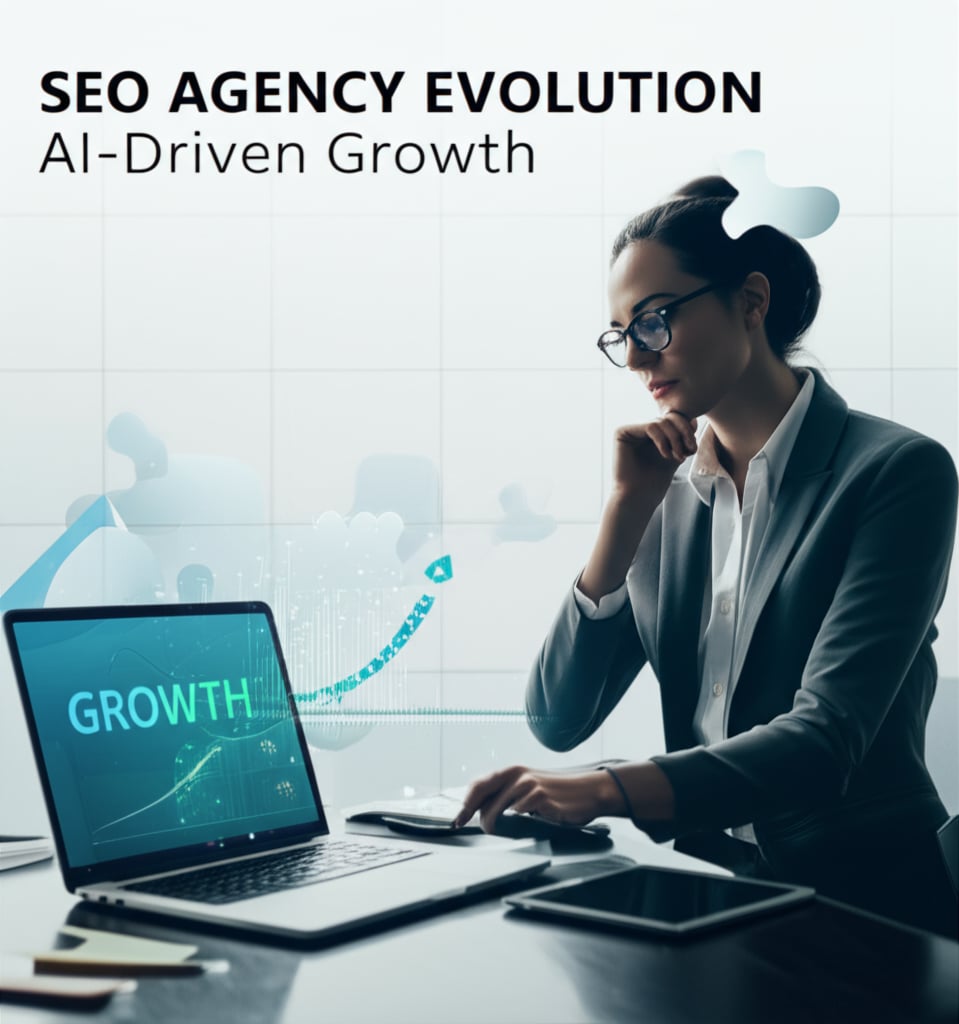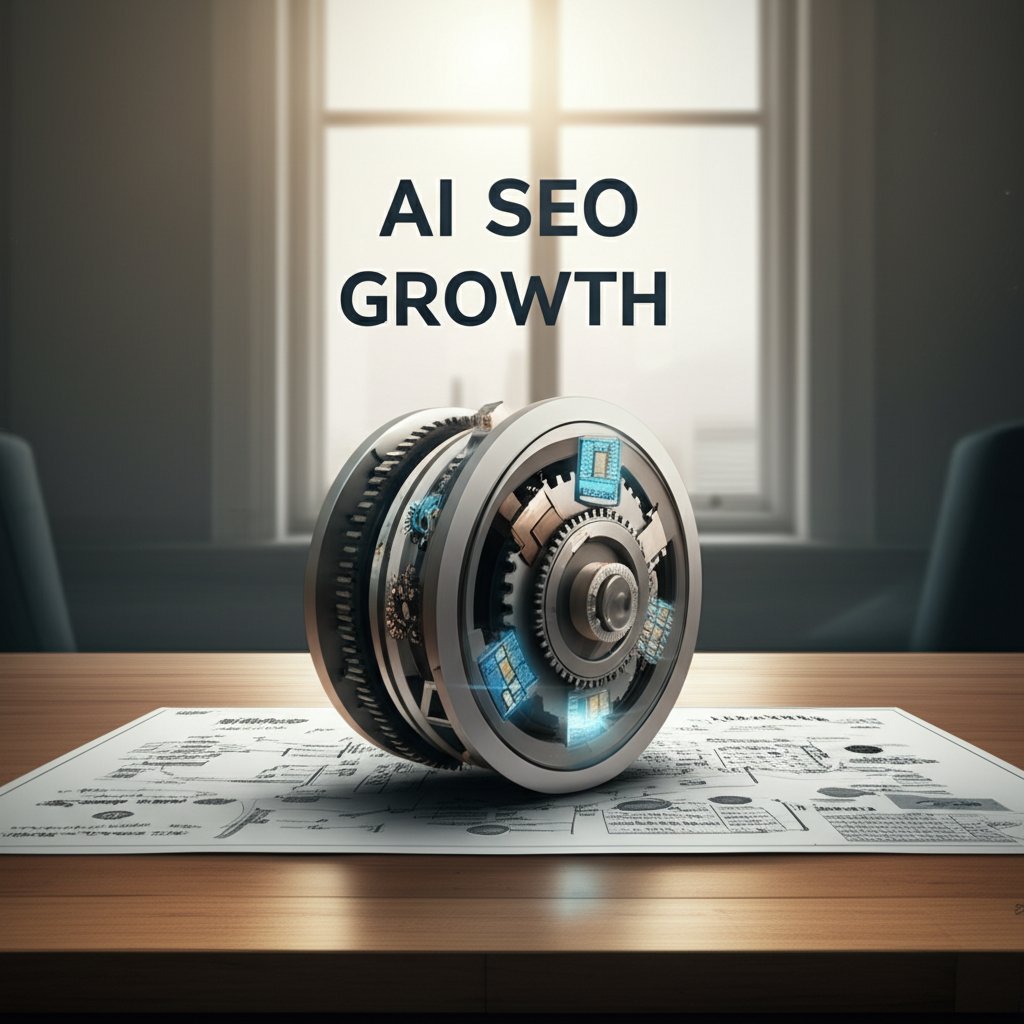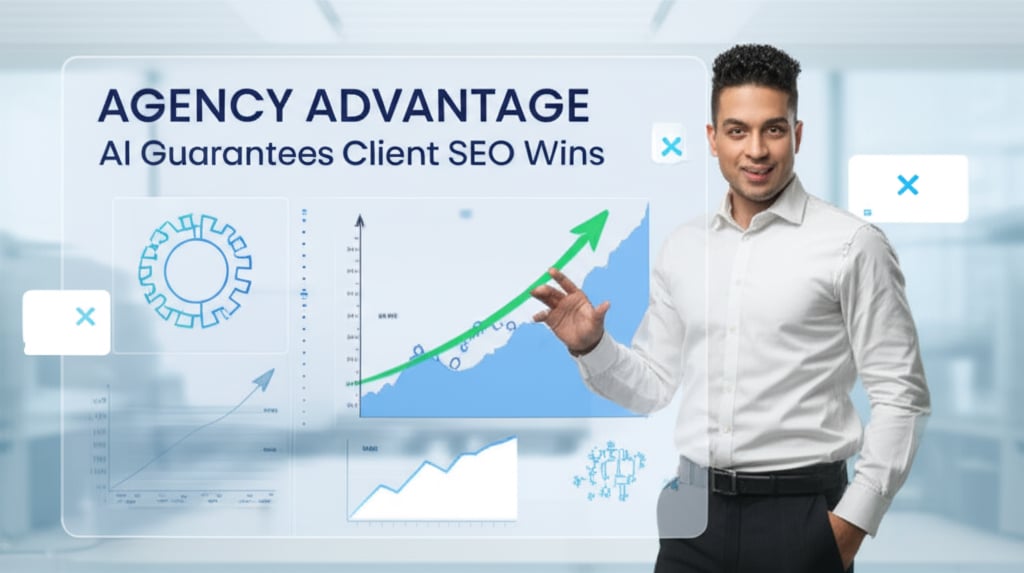SEO Agency Evolution: Proven Guide to AI-Driven Growth
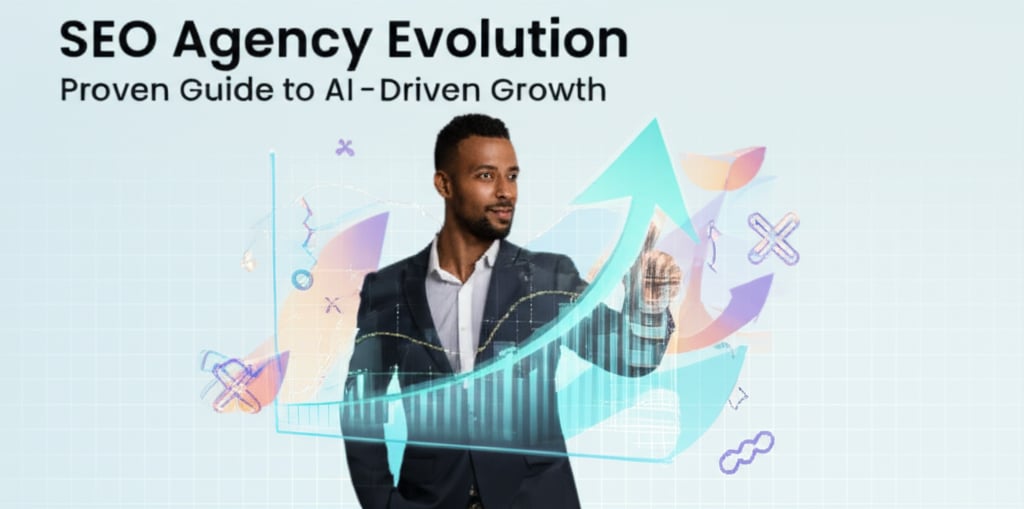
The digital marketing realm is undergoing a profound transformation. A recent report by Gartner forecasts a potential 25% drop in conventional search engine traffic by 2026, primarily due to the ascendancy of AI-driven chatbots and generative AI overviews. This pivotal moment presents a clear choice for SEO agencies: either strategically integrate AI into their operations or risk becoming obsolete. For proactive founders and agile marketing teams, leveraging artificial intelligence is no longer merely an option; it's a strategic imperative to boost client rankings, streamline workflows, and significantly expand profit margins.
The Shifting Search Paradigm: From SEO to GEO
The traditional approach to search engine optimization, which historically emphasized keyword density and backlink volume, is undergoing a profound metamorphosis. We are witnessing a transition from what was once solely SEO to a more expansive framework now known as Generative Engine Optimization, or GEO. This evolution signifies a move towards "Search Everywhere Optimization," where online visibility extends beyond conventional search result pages to encompass AI-powered answer engines like ChatGPT and Perplexity, alongside Google’s proprietary AI Overviews.
Observations from seasoned digital marketing professionals suggest that while the established SEO playbook feels different, the field is far from defunct. Instead, it is evolving, giving rise to novel opportunities. The proliferation of "zero-click" searches, where AI directly provides user answers on the SERP, means that simply achieving a high ranking is no longer enough; agencies must now optimize for inclusion and accurate citation within these AI-generated responses. Furthermore, Google's heightened emphasis on E-E-A-T (Experience, Expertise, Authoritativeness, and Trustworthiness) underscores the enduring importance of authentic, human-centric content, even as AI plays a supporting role in its creation.
This "Great Decoupling," a phenomenon where impressions may rise but direct website clicks decline, necessitates a diversified, multi-platform strategy. Establishing a strong, authoritative presence across various channels, including social search platforms such as TikTok and YouTube, is now paramount. The overarching objective is to ensure a brand's presence wherever a potential customer seeks information, thereby guaranteeing comprehensive visibility within an increasingly fragmented search ecosystem.
Key Takeaway: Search is fragmenting; comprehensive visibility now requires strategic, multi-platform optimization beyond traditional SERPs.
Elevating Client Rankings with Intelligent AI-Enhanced Strategies
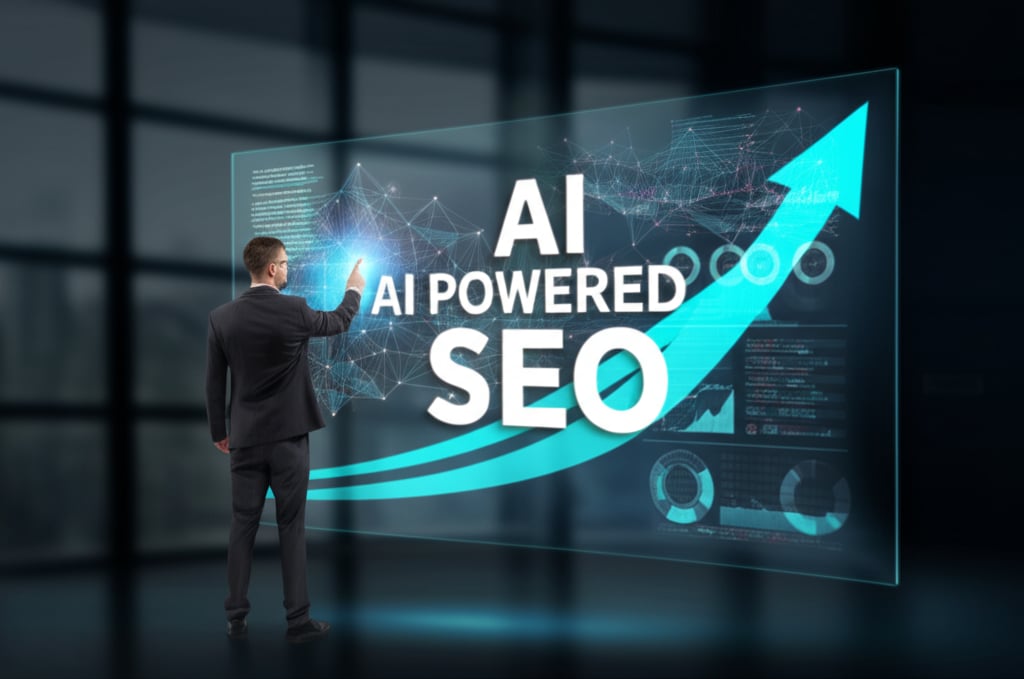
Many SEO agencies historically struggled with antiquated link-building tactics and the consistent production of uninspired, generic content, often resulting in lackluster client performance. The modern SEO agency must now implement superior link acquisition and content strategies, intelligently augmented by AI, to secure top-tier rankings.
To achieve this, agencies should adopt a structured methodology to enhance their content and link profiles:
- Prioritize Quality Over Sheer Volume in Link Building: Industry discussions consistently highlight that a single, high-quality link can vastly outweigh the value of hundreds of inferior ones. The emphasis must shift to acquiring links from genuinely authoritative and topically relevant domains, rather than merely accumulating a large number of referring domains. Evaluating the true quality of websites by assessing their actual, relevant traffic and search rankings, instead of focusing on superficial metrics like Domain Authority, is critical.
- Focus on Content Curation and Strategic Placement: Instead of simply embedding links into existing content, agencies must pivot to curating fresh content specifically designed to support the target link. This approach ensures deep contextual relevance and maximizes the link's potential impact. Crafting content that resonates with the host website's audience, while subtly guiding them towards the client's solution, is a nuanced and powerful art.
- Diversify Content Voice and Tone: To cultivate a credible and organic link profile, it's essential to vary the narrative style of external content. Incorporating first-person narratives, for example, can make content feel more authentic and immediate, boosting engagement and establishing authority, particularly when attributed to a recognized expert.
- Emphasize Relevant Website Traffic Quality: The genuine value of a linking website lies in its relevant traffic, not just its overall visitor numbers. A site attracting 2,000 highly targeted visitors is exponentially more valuable than one with 50,000 irrelevant or bot-generated visits. Tools like Semrush and Ahrefs can assist in this granular analysis, pinpointing keywords for which a site truly ranks and where the audience aligns.
- Consider a Logically Structured Private Blog Network (PBN): While often viewed with skepticism, a strategically constructed, high-quality PBN can serve as a potent asset for establishing niche authority. By developing complementary content sites around a client's core offering and linking logically between them, an agency can forge a robust, authoritative network that significantly amplifies ranking power.
This strategic approach to content and link acquisition is precisely where platforms like OutBlog offer an undeniable competitive edge. OutBlog functions as a proprietary content automation engine, meticulously engineered to convert expertise into top-ranking articles. It streamlines the entire content lifecycle, from identifying high-value keywords and content gaps overlooked by competitors to crafting SEO-optimized outlines and generating high-quality content. For agencies, this translates to consistently delivering top-tier client results, securing high-value backlinks, and establishing market authority without the traditional overhead, thereby becoming an indispensable tool for achieving consistent Google domination.
Key Takeaway: Strategic, AI-informed content and link acquisition, supported by advanced automation, redefine the path to ranking supremacy.
Scaling Operations: AI as Your Strategic Force Multiplier
For SEO agencies, AI is not merely a utility for isolated tasks; it represents a fundamental paradigm shift in operational methodology, acting as a strategic force multiplier. AI-powered tools are revolutionizing workflows, compressing tasks that once took days into mere minutes.
- Content Creation and Optimization: AI tools dramatically reduce content production time, with some marketers reporting a 50-75% reduction. They assist in generating initial content drafts, optimizing existing material for search engines and AI overviews, and adapting content for diverse platforms—transforming a single blog post into social media updates, email newsletters, and even AI-generated images. This efficiency aligns perfectly with the "Great Decoupling," ensuring content reaches audiences across all touchpoints. Platforms like Writesonic exemplify how AI can track visibility across multiple AI platforms, optimizing content for broader reach.
- Keyword Clustering and Topic Modeling: AI excels at discerning patterns within vast datasets. Tools can group related keywords into semantic clusters, enabling the construction of comprehensive content strategies that cultivate topical authority. Neural Topic Modeling (NTM) extends beyond basic keyword research, uncovering latent topics, meaningfully grouping similar content, and identifying crucial keywords for each area.
- Automation of Technical SEO Tasks: Repetitive and time-consuming technical SEO tasks are efficiently managed by AI. Automated systems can generate and update XML sitemaps, conduct technical audits for broken links, duplicate content, and schema markup issues, and even optimize for mobile experiences. AI tools can also generate meta tags and descriptions in seconds, liberating valuable human capital. The benefits of such automation are evident in tools like Zapier and make.com, which streamline cross-application workflows, or specific SEO suites like Semrush and Ahrefs, which offer AI-driven insights for competitive analysis and content gap identification. Even graphic design tasks can be expedited with tools like Canva, allowing teams to create high-quality visuals rapidly.
- Hyper-Personalization and Predictive Analytics: AI facilitates the delivery of highly personalized content and experiences at an unprecedented scale. For B2B clients, this translates to dynamically personalized website experiences, tailored content recommendations, and customized email campaigns based on behavioral triggers. AI also processes massive customer data to predict future behaviors, identifying high-value prospects and anticipating customer needs, which is a key differentiator in a strategy-first approach that prioritizes measurable results.
- Enhanced Customer Experience with Conversational AI: AI-powered chatbots and virtual assistants now provide sophisticated 24/7 customer support, qualify leads through intelligent questioning, and personalize product recommendations based on conversational context. This not only enhances operational efficiency but also significantly boosts client satisfaction. Solutions such as MyAskAI highlight how AI agents can deflect support requests, improving response times and freeing up human agents.
While the market may experience "AI saturation" from an overwhelming array of tools, the strategic implementation of AI solutions remains crucial. It's about discerning where AI genuinely amplifies specific marketing objectives and customer experiences, rather than simply adopting every new technology. This discerning approach ensures that AI serves business goals, rather than the other way around.
Key Takeaway: AI automates routine tasks and provides deep insights, empowering human talent to focus on high-level strategy, creativity, and building authentic customer relationships.
Maximizing Margins: Strategic AI Investment and Operational Excellence
For SEO agencies, the integration of AI isn't just about fostering efficiency; it's a direct route to maximizing profit margins. By strategically investing in AI, agencies can deliver superior value to clients while drastically reducing operational costs, thereby expanding profitability.
Insights from various entrepreneurs indicate that the most successful AI applications concentrate on resolving specific, costly problems within niche industries. This principle underpins the "AI Automation Agency" model, which emphasizes custom AI solutions over generic tools. The core idea is to adopt a consultant-first approach, thoroughly understanding a client's pain points before proposing AI solutions. This ensures that the solutions developed deliver tangible, measurable value, justifying premium pricing.
- Value-Based Pricing: If an AI solution saves a client 40 hours per week, the pricing should reflect that substantial value, not merely a low consumer-app subscription. Businesses are often willing to pay significant sums to address compliance issues or mitigate risk, underscoring the importance of framing AI solutions in terms of clear business outcomes, such as reduced customer acquisition costs (CAC) or increased customer lifetime value (CLTV), rather than just incremental productivity gains. Tools like Concord demonstrate how AI-powered agreement intelligence can automate tasks, saving significant time and resources.
- Operational Streamlining: AI tools, such as those that automate technical SEO audits, content generation, or keyword research, directly reduce the manual labor required for these tasks. This capacity allows agencies to manage a larger client portfolio with the same or even fewer resources, directly enhancing the revenue-per-employee metric. Furthermore, platforms like OutBlog streamline content creation, optimization, and direct publishing, enabling agencies to scale client results consistently without ballooning overhead.
- Avoiding Over-Reliance Risks: However, an excessive reliance on AI without human oversight can lead to "Model Autophagy Disorder" (MAD), a phenomenon where AI-generated content becomes generic and loses its unique originality. This predicament underscores the necessity for a balanced human-AI partnership. Human strategists must guide AI, refine its output, and ensure brand voice consistency to maintain quality and avoid potential Google penalties, as human-written content has historically demonstrated greater resilience to algorithm updates.
Strategic AI investment empowers agencies to offer enterprise-level services at a fraction of the traditional cost, attracting higher-value clients and improving retention rates. By focusing on niche problems and demonstrating clear ROI, agencies can position themselves as indispensable partners, commanding higher fees and ensuring robust margins. This synergistic approach allows forward-thinking agencies to deliver unparalleled digital success for their clients.
Key Takeaway: AI investments must be strategic, value-driven, and focused on solving specific niche problems to achieve optimal profitability and sustainable growth.
Case Study: Architecting Consistent Top-Tier Performance
A mid-sized SaaS SEO agency, grappling with increasing client churn exacerbated by the "Great Decoupling" and declining organic clicks, recognized the critical need for transformation. Their conventional SEO strategies, while effective in the past, were struggling to maintain client visibility in the new AI-driven search landscape. They decided to pivot towards a comprehensive "Search Everywhere Optimization" (GEO) strategy, embracing advanced AI automation.
The agency strategically adopted a platform similar to OutBlog, an AI-powered content automation engine. This enabled them to:
- Rapidly Identify Content Gaps: The AI engine meticulously analyzed competitor content and identified high-value, long-tail keywords that traditional methods often overlooked, allowing the agency to target uncontested ranking opportunities with precision.
- Automate High-Quality Content Creation: Utilizing the AI-powered platform, the agency could generate fully optimized, authoritative content at an unprecedented pace. The system learned client brand voices, ensuring consistency and originality, and automatically embedded relevant multimedia, from images to videos.
- Streamline Publishing and Optimization: The platform automated the direct publishing of articles to client blogs and continuously optimized content for both traditional search engine rankings and AI Overviews, ensuring maximum reach.
Within six months of implementing this AI-driven strategy, the agency achieved remarkable results:
- 30% Increase in Client Visibility: Client brands experienced a significant boost in their appearance within AI Overviews across Google, ChatGPT, and Perplexity, expanding their reach far beyond traditional website clicks.
- 60% Improvement in Content Production Efficiency: The time required to research, write, and publish high-quality blog posts was reduced by more than half, enabling the agency to onboard more clients without needing to increase staff.
- 40% Reduction in Content-Related Overhead: Manual tasks associated with content creation, editing, and distribution were almost entirely eliminated, leading to substantial cost savings.
- 20% Growth in Client Retention: Clients experienced tangible improvements in their online presence and lead generation, leading to higher satisfaction levels and longer contract durations.
- Expanded Agency Margins: The powerful combination of increased efficiency, reduced operational costs, and enhanced client value directly translated into a substantial boost in the agency's overall profitability.
This case study vividly demonstrates that by embracing AI as a core strategic asset, SEO agencies can not only overcome the formidable challenges of an evolving search landscape but also architect a scalable, high-performance model for consistent market domination.
Key Takeaway: Integrated AI adoption transforms agency performance, enhances client satisfaction, and drives significant margin expansion.
Overcoming Challenges: Ethical AI, Quality Control, and Human Oversight
While AI presents unparalleled opportunities, its seamless integration into SEO strategies is not without its hurdles. Concerns surrounding content quality, originality, and ethical considerations demand meticulous management to ensure sustainable success.
- Content Quality and Originality: A significant concern, frequently echoed in online discussions, is the potential for AI tools to produce generic, undifferentiated content. While AI excels at grammatically correct text, it may inherently lack the human nuance, unique insights, or original thought essential to genuinely engage audiences. Google's helpful content updates specifically target content created solely for ranking rather than providing genuine user value. Therefore, content generated by AI necessitates robust human editing, fact-checking, and refinement to inject authentic expertise, brand voice, and originality. This human touch can be augmented by skilled editors who ensure the final output resonates with human readers.
- The Human-AI Partnership: The most effective approach involves a strategic balance, often conceptualized as a 70% human strategy guiding a 30% AI execution. This ratio, while dynamic and subject to evolution, unequivocally underscores that human creativity, critical thinking, and ethical judgment remain indispensable. AI should function as a sophisticated assistant, automating research, drafting, and optimization, thereby liberating human marketers to concentrate on high-level strategy, compelling storytelling, and nurturing client relationships. Furthermore, investing in AI literacy training for teams is crucial to bridge cultural anxieties and cultivate a growth mindset, enabling them to harness AI effectively rather than fearing its impact.
- Ethical and Transparency Issues: AI systems can inadvertently inherit biases from their training data, potentially leading to algorithmic bias in search rankings. Data privacy is another critical concern, particularly when proprietary client information is utilized to train AI models. Agencies must maintain absolute transparency with clients regarding the tools employed, data handling practices, and ensure robust security protocols. The widely reported incident involving Microsoft Copilot revealing confidential data highlights the severe risks associated with unprotected information. Clear protocols for human oversight are thus essential to retain control and accountability over AI systems, ensuring decisions are explainable and ethical standards are consistently upheld.
By proactively addressing these challenges, agencies can leverage AI's immense power while simultaneously safeguarding brand integrity, maintaining exceptionally high content quality, and adhering to stringent ethical guidelines. This balanced approach ensures AI is a force for good, driving authentic value and fostering long-term trust.
Key Takeaway: Human intelligence and stringent ethical guidelines are critical for sustainable AI success, ensuring quality, originality, and trust in an AI-powered world.
FAQ: Navigating the AI SEO Frontier
Agencies frequently pose crucial questions about navigating the rapidly evolving AI SEO landscape. Here are common inquiries and authoritative responses:
- How is AI affecting traditional SEO in 2025? AI is fundamentally reshaping how users discover and consume information. The emergence of AI Overviews, along with platforms like ChatGPT and Perplexity, means users are increasingly receiving direct, synthesized answers without needing to click through to websites. This phenomenon directly contributes to a reduction in organic clicks, particularly for informational queries. While traditional SEO tactics such as keyword targeting and link building still retain their importance, agencies must now prioritize visibility within AI-generated responses, not merely on the Search Engine Results Page (SERP).
- What is Generative Engine Optimization (GEO)? GEO represents the strategic evolution of SEO, specifically focusing on optimizing content and brand presence for AI-powered search engines and large language models (LLMs). It entails creating structured, semantically clear, and authoritative content that AI models can readily comprehend, extract, and effectively reuse in their synthesized answers. GEO ensures sustained brand visibility and influence even in scenarios where direct website clicks are minimized.
- Do backlinks still matter in AI-driven SEO? Yes, backlinks continue to hold significant weight for traditional search rankings. However, their specific role in LLM-driven content discovery is evolving. AI models prioritize content quality, clarity, and relevance. While direct hyperlinks might be less crucial for AI citations, mentions in trusted sources—even without an explicit hyperlink—are increasingly influential for establishing authority and being subsequently cited in AI-generated responses. Quality and contextual relevance remain paramount.
- How can agencies ensure content quality with AI? Ensuring content quality with AI requires a human-centric approach. Agencies should strategically deploy AI for initial drafting, comprehensive research, and optimization, but unequivocally rely on human experts for critical editing, meticulous fact-checking, and infusing unique insights and the distinct brand voice. Implementing a "70% human strategy to 30% AI execution" serves as a robust framework. The overarching goal is to produce content that is not just grammatically flawless but genuinely useful, authoritative, and perfectly aligned with E-E-A-T principles, ensuring it stands out distinctively in an increasingly AI-influenced digital world.
Key Takeaway: Proactive adaptation, a clear understanding of AI's impact, and informed decision-making are essential for long-term agency success and market leadership.
Future-Proofing Your Agency for AI-Domination
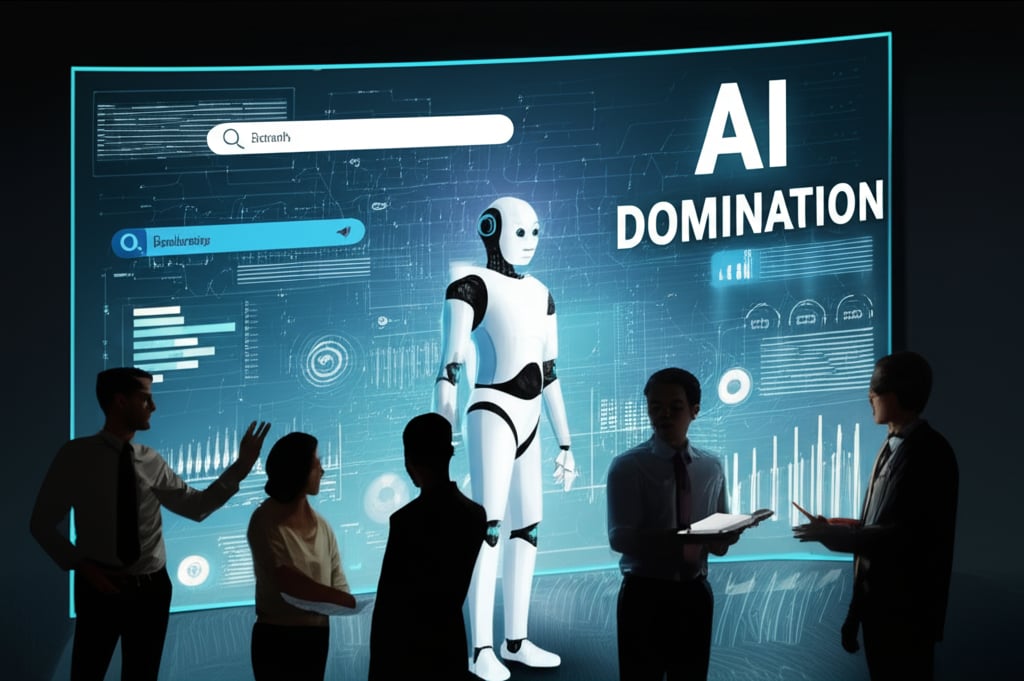
The future trajectory of SEO agencies is intrinsically linked to their capacity to strategically integrate AI. The data unequivocally demonstrates that AI Overviews will continue to reduce direct clicks, yet citations and multi-platform visibility will become more valuable than ever. Agencies must fully embrace this new reality, recognizing that the human-AI partnership is the definitive pathway to sustained growth and market conquest.
This calls for deliberate and decisive action: investing in the right AI tools, such as the comprehensive content automation capabilities offered by OutBlog or similar innovative platforms, to streamline operations and ensure unparalleled content quality. Training teams in AI literacy is not just an advantage, but an absolute necessity, fostering an environment where innovation thrives. Above all, maintaining a delicate yet powerful balance between AI's unparalleled efficiency and human creativity—with human expertise guiding strategy and AI executing with precision—will indisputably define the market leaders. Agencies that master this synergy will not merely survive; they will undeniably dominate the evolving digital landscape, cementing their position as the authoritative force in their respective niches, offering unparalleled solutions for digital success. The time to stop merely blogging and start dominating search engine results is now.
